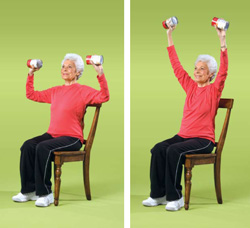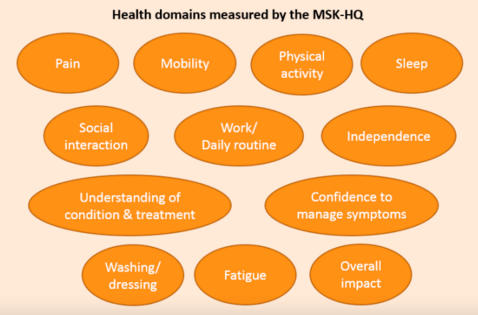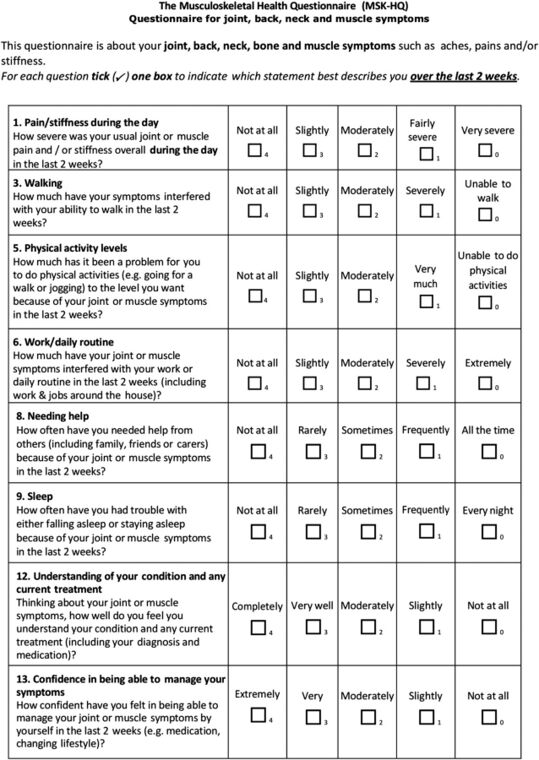Musculoskeletal Health Questionnaire
Original Editor - Maram Salem
Top Contributors - Maram Salem
Objective[edit | edit source]
The Musculoskeletal Health Questionnaire (MSK-HQ) is a Patient Reported Outcome Measure (PROM) intended for use with patients with various musculoskeletal conditions.[1] The aim of the MSK-HQ is to provide clinicians a snapshot of a patient's current musculoskeletal health and allow monitoring their progress over time. Its overarching goals include identifying meaningful aspects of health relevant to the patient and clinician, to be applicable for use by different health professionals, and easy to use.[2]
Intended Population[edit | edit source]
The MSK-HQ is intended for patients with any musculoskeletal condition for adults older than 18 years of age.[3] It is a questionnaire that is responsive to change across a range of musculoskeletal conditions over the course of treatment, with patients reporting that the outcome measure was highly relevant and easy to understand.[2]
Method of Use[edit | edit source]
The MSK-HQ consists of health domains that matter most to people:[1]
- pain severity (in the day and in the night)
- physical function (walking and dressing)
- physical activity level
- pain interference (with daily activities and social/hobbies)
- difficulty with sleep
- emotional well-being
- understanding of diagnosis and treatment
- confidence to self-manage pain
- independence
- overall impact from symptoms
Patients are given the questionnaire prior to the start of their physical therapy plan of care. Patients are instructed to check a box in each of the domains listed. It is a a 5-point scale, "4" representing "not at all" and "0" representing "very severe." Following physical therapy treatment, patients are asked to complete the questionnaire again. It is important to note that items 12 and 13 on the form have the responses listed in reverse order.[3]
All 14 items are summed together with a maximum total of 56 points.
A sample of the Musculoskeletal Health Questionnaire can be found here.
Evidence[edit | edit source]
The Musculoskeletal Health Questionnaire (MSK-HQ) demonstrates validity, sensitivity, reliability, and high responsiveness.[4] Patients found the MSK-HQ easy to complete (completion rates of 94%).[3] Diagnoses tested include conditions in primary care, hip replacement, knee replacement, and undergoing shoulder surgery. Current emerging research indicates high sensitivity and validity with patients with inflammatory arthritis.[5]
Reliability[edit | edit source]
MSK-HQ has excellent test-retest reliability (intraclass correlation coefficient=0.84) and a high level of internal consistency (Cronbach’s α=0.88).[2]
Validity[edit | edit source]
The MSK-HQ has good convergent validity when measured against EuroQuol 5-Dimension (EQ-5D) with a Spearman rank correlation coefficient of 0.81, respectively.[3]
Responsiveness[edit | edit source]
The MSK-HQ boasts a high responsive rate. Completion rates were high (94.2%), with scores normally distributed, and no floor/ceiling effects.[2]
Advantages[edit | edit source]
- It is more sensitive than the EuroQuol 5 Dimension 5 L (EQ-5D).
- It measures a patient's overall musculoskeletal health and/or quality of life.
- It measures domains that are important to a patient's daily functions.
- Individual domains (e.g., pain, physical activity level, difficulty sleeping) can be tracked to help direct care.[4]
Disadvantages[edit | edit source]
- The current research does not take into account the state or level of disease stage within each cohort assessed.
- Some patients do not provide a final MSK-HQ score (can be due to early discharge or noncompliance with therapy program).
- Research is still evolving, with new emerging research on arthritic conditions.[5] Therefore, it cannot be applied to all musculoskeletal conditions yet.
References[edit | edit source]
- ↑ 1.0 1.1 The Arthritis Research UK Musculoskeletal Health Questionnaire Developing and piloting a generic patient reported outcome measure for us across musculoskeletal care pathways [Internet]. [cited 2023 Nov 26]. Available from: https://versusarthritis.org/media/2180/msk-health-questionnaire-briefing-june-2016.pdf
- ↑ 2.0 2.1 2.2 2.3 Hill JC, Kang S, Benedetto E, Myers H, Blackburn S, Smith S, et al. Development and initial cohort validation of the Arthritis Research UK Musculoskeletal Health Questionnaire (MSK-HQ) for use across musculoskeletal care pathways. BMJ Open 2016 Aug;6(8):e012331
- ↑ 3.0 3.1 3.2 3.3 Price AJ, Ogollah R, Kang S, Hay E, Barker KL, Benedetto E, et al. Determining responsiveness and meaningful changes for the Musculoskeletal Health Questionnaire (MSK-HQ) for use across musculoskeletal care pathways. BMJ open 2019;9(10):e025357
- ↑ 4.0 4.1 Developing and validating the MSK-HQ Musculoskeletal Health Questionnaire [Internet]. [cited 2023 Nov 26]. Available from: https://rcc-uk.org/wp-content/uploads/2017/02/Jonathan-Hill-MSK-HQ.pdf
- ↑ 5.0 5.1 Norton S, Ellis B, Santana Suárez B, Schwank S, Fitzpatrick R, Price A, et al. Validation of the Musculoskeletal Health Questionnaire in inflammatory arthritis: a psychometric evaluation. Rheumatology. 2018 Aug 10;58(1):45–51.









